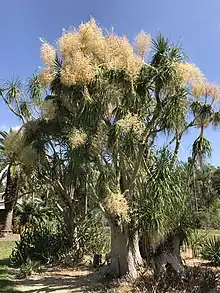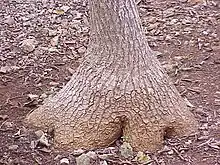| Beaucarnea pliabilis | |
|---|---|
 | |
| At Fairchild Tropical Botanic Garden, Florida | |
| Scientific classification | |
| Kingdom: | Plantae |
| Clade: | Tracheophytes |
| Clade: | Angiosperms |
| Clade: | Monocots |
| Order: | Asparagales |
| Family: | Asparagaceae |
| Subfamily: | Nolinoideae |
| Genus: | Beaucarnea |
| Species: | B. pliabilis |
| Binomial name | |
| Beaucarnea pliabilis | |
| Synonyms[3] | |
| |
Beaucarnea pliabilis is a tree in the family Asparagaceae, native to the Yucatán Peninsula. It grows up to 10 metres (30 ft) tall.[1]
Distribution and habitat
Beaucarnea pliabilis is endemic to the Yucatán Peninsula, including parts of Mexico, Belize and Guatemala. Its habitat is in dry forest, moist lowland forest and swamp forest, from sea level to 800 m (2,600 ft).[1]
Conservation
Beaucarnea pliabilis has been assessed as vulnerable on the IUCN Red List. It is threatened by conversion of land for urban development and cattle farming. Fires and hurricanes pose an additional threat in the region. The species is increasingly threatened by illegal harvesting for the ornamental plant trade. The tree's range includes numerous protected areas, however population decline has continued.[1]

References
- 1 2 3 4 Fuentes, A.C.D.; Samain, M.-S. & Martínez Salas, E. (2020). "Beaucarnea pliabilis". IUCN Red List of Threatened Species. 2020: e.T162240408A162240890. Retrieved 31 December 2021.
- ↑ "Appendices | CITES". cites.org. Retrieved 2022-01-14.
- 1 2 "Beaucarnea pliabilis". Plants of the World Online. Royal Botanic Gardens, Kew. Retrieved 31 December 2021.
